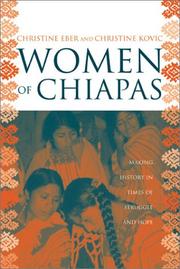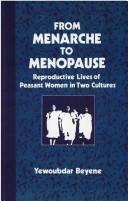| Listing 1 - 6 of 6 |
Sort by
|

ISBN: 0415945569 0203954815 1135394083 9781135394080 9780203954812 9780415945561 0415945577 9780415945578 9781135394158 9781135394226 1135394156 Year: 2003 Publisher: New York London
Abstract | Keywords | Export | Availability | Bookmark
 Loading...
Loading...Choose an application
- Reference Manager
- EndNote
- RefWorks (Direct export to RefWorks)
This book presents the concerns, visions and struggles of women in Chiapas, Mexico in the context of the uprising of the Zapatista Army of National Liberation (EZLN). The book is organized around three issues that have taken center state in women's recent struggles-structural violence and armed conflict; religion and empowerment and women's organizing. Also includes maps.
Maya women --- Women --- Mayan women --- Mayas --- Women, Maya --- Human females --- Wimmin --- Woman --- Womon --- Womyn --- Females --- Human beings --- Femininity --- Social conditions. --- Chiapas (Mexico) --- History
Book
ISBN: 029274868X 1477302107 0292748698 Year: 2013 Publisher: Austin, Tex. : University of Texas Press,
Abstract | Keywords | Export | Availability | Bookmark
 Loading...
Loading...Choose an application
- Reference Manager
- EndNote
- RefWorks (Direct export to RefWorks)
This study of the Guatemalan legal system during the regimes of two of Latin America's most repressive dictators reveals the surprising extent to which Maya women used the courts to air their grievances and defend their human rights.
Sex discrimination in criminal justice administration --- Maya women --- History --- Legal status, laws, etc. --- Crimes against --- Social conditions --- Mayan women --- Mayas --- Women, Maya --- Women --- Criminal justice, Administration of
Book
ISBN: 0813599008 0813598974 0813598966 0813598982 9780813599007 9780813598970 9780813598970 9780813598963 Year: 2019 Publisher: New Brunswick
Abstract | Keywords | Export | Availability | Bookmark
 Loading...
Loading...Choose an application
- Reference Manager
- EndNote
- RefWorks (Direct export to RefWorks)
Beyond Repair? explores Mayan women's agency in the search for redress for harm suffered during the genocidal violence perpetrated by the Guatemalan state in the early 1980s at the height of the thirty-six-year armed conflict. The book draws on eight years of feminist participatory action research conducted with fifty-four Q'eqchi', Kaqchikel, Chuj, and Mam women who are seeking truth, justice, and reparation for the violence they experienced during the war, and the women's rights activists, lawyers, psychologists, Mayan rights activists, and researchers who have accompanied them as intermediaries for over a decade. Alison Crosby and M. Brinton Lykes use the concept of "protagonism" to deconstruct dominant psychological discursive constructions of women as "victims," "survivors," "selves," "individuals," and/or "subjects." They argue that at different moments Mayan women have been actively engaged as protagonists in constructivist and discursive performances through which they have narrated new, mobile meanings of "Mayan woman," repositioning themselves at the interstices of multiple communities and in their pursuit of redress for harm suffered.
Maya women --- Women --- Human females --- Wimmin --- Woman --- Womon --- Womyn --- Females --- Human beings --- Femininity --- Mayan women --- Mayas --- Women, Maya --- Social conditions. --- Crimes against --- Guatemala --- Gvatemala --- Goatemala --- Republic of Guatemala --- República de Guatemala --- Central America (Federal Republic) --- History --- Social aspects. --- Atrocities.
Dissertation
ISBN: 9187380528 Year: 2001
Abstract | Keywords | Export | Availability | Bookmark
 Loading...
Loading...Choose an application
- Reference Manager
- EndNote
- RefWorks (Direct export to RefWorks)
Maya women --- -Maya women --- -Women --- -Human females --- Wimmin --- Woman --- Womon --- Womyn --- Females --- Human beings --- Femininity --- Mayan women --- Mayas --- Women, Maya --- Women --- Ethnic identity --- Government relations --- Social conditions --- Identity --- Guatemala --- Social conditions. --- Theses --- Ethnic identity. --- Government relations. --- Identity. --- -Ethnic identity --- Human females
Book
ISBN: 0803285833 0803285817 9780803285811 9780803285835 0803285825 9780803285828 9780803284616 0803284616 9780803285828 9781496208477 1496208471 Year: 2016 Publisher: Lincoln : Baltimore, Md. : University of Nebraska Press, Project MUSE,
Abstract | Keywords | Export | Availability | Bookmark
 Loading...
Loading...Choose an application
- Reference Manager
- EndNote
- RefWorks (Direct export to RefWorks)
Packing house workers --- Immigrant women --- Maya women --- Guatemalans --- Mayan women --- Mayas --- Women, Maya --- Women --- Ethnology --- Immigrants --- Meat industry and trade --- Social conditions. --- Employees --- Nebraska --- Guatemala --- Gvatemala --- Goatemala --- Republic of Guatemala --- República de Guatemala --- Central America (Federal Republic) --- State of Nebraska --- Nebraska Territory --- Emigration and immigration. --- Packing-house workers --- Women immigrants

ISBN: 0585063524 9780585063522 0887068669 9780887068669 0887068677 9780887068676 0791496686 Year: 1989 Publisher: Albany State University of New York Press
Abstract | Keywords | Export | Availability | Bookmark
 Loading...
Loading...Choose an application
- Reference Manager
- EndNote
- RefWorks (Direct export to RefWorks)
While menopause is a universal fact of life, the physiological and psychological effects for women are not the same in all cultures. In this comparative and cross-cultural ethnographic study, Beyene examines the concept and experience of menopause among Greek and Mayan peasant women, uncovering some startling information. Available research and experience thus far suggests that non-Western, nonindustrialized women often do not have the same psychological or physiological reactions to menopause as Western, industrialized women do.By comparing the reproductive histories of one group of peasant women to another, the author makes it possible to isolate historical, cultural and environmental factors relating to variations or similarities in response to menopause. Her findings underscore the plasticity of the human aging experience, particularly among women. The book presents a biocultural view linking the experience of menopause to diet and fertility patterns, and provides new insights and hypotheses on the reproductive cycle and aging in women.
Menopause --- Menarche --- Maya women. --- Women --- Sex role --- Women peasants --- Nature and nurture. --- Cross-Cultural Comparison. --- Menarche. --- Menopause. --- Change of Life, Female --- Transcultural Studies --- Comparison, Cross-Cultural --- Comparisons, Cross-Cultural --- Cross Cultural Comparison --- Cross-Cultural Comparisons --- Studies, Transcultural --- Study, Transcultural --- Transcultural Study --- Cultural Characteristics --- Culture --- Environment and genetics --- Environment and heredity --- Genetics and environment --- Heredity and environment --- Nature --- Nature versus nurture --- Nurture and nature --- Genetics --- Heredity --- Human beings --- Peasant women --- Peasants --- Rural women --- Mayan women --- Mayas --- Women, Maya --- Menstruation --- Puberty --- Change of life in women --- Female change of life --- Female climacteric --- Climacteric --- Nurture --- Effect of environment on --- Women's Rights --- Social Science --- Political Science --- Women's rights --- Social science --- Political science
| Listing 1 - 6 of 6 |
Sort by
|

 Search
Search Feedback
Feedback About UniCat
About UniCat  Help
Help News
News